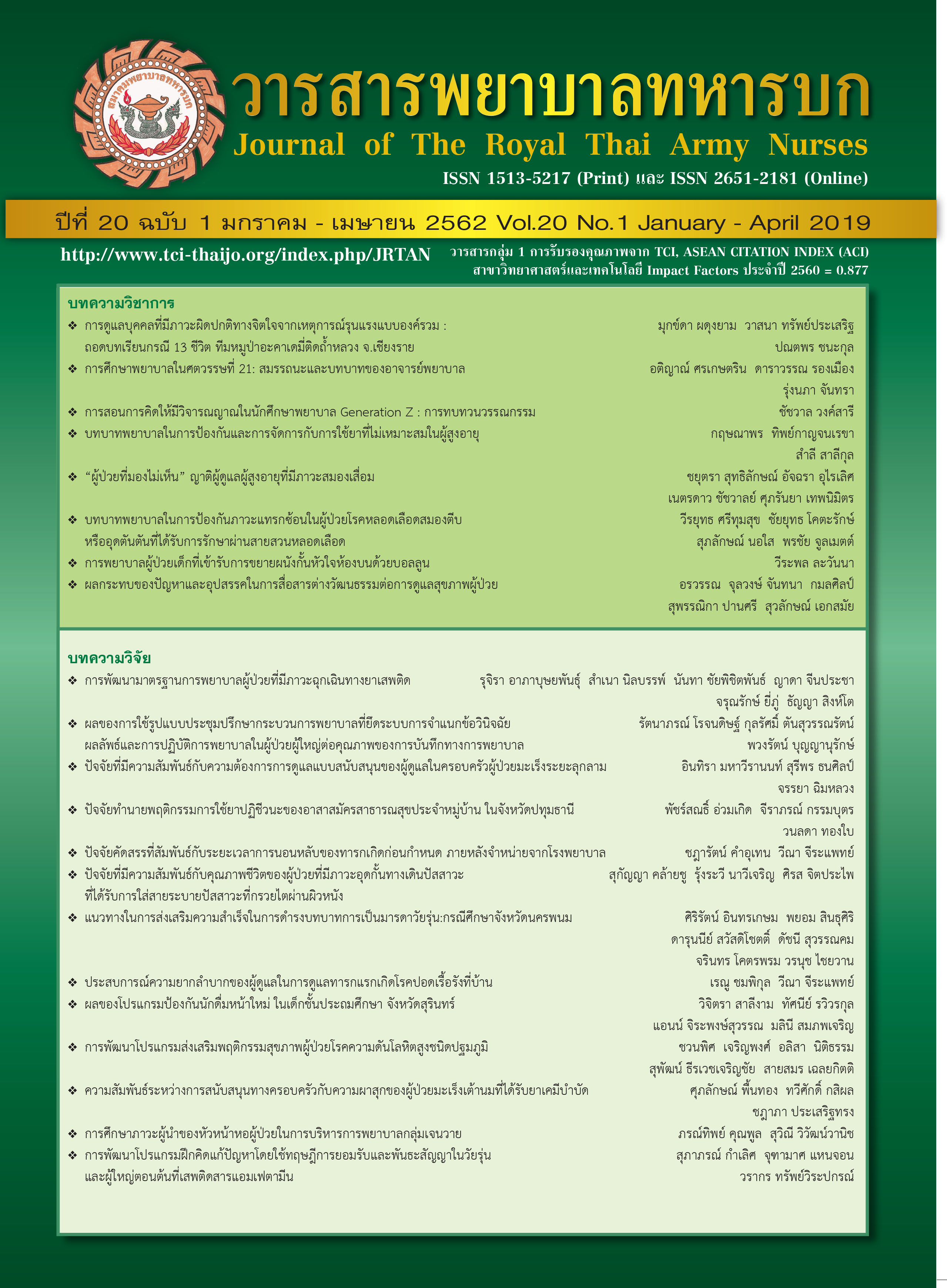The Training Development Curriculum Cognitive Skills for The Elderly
Keywords:
elderly, cognitive skills, training curriculum, evaluate the training curriculumAbstract
In this dissertation, the researcher studies (1) how the elderly use necessary cognitive skills in addition to developing (2) a cognitive skills training curriculum for the elderly. Finally, furthermore (3) the curriculum developed by the researcher is evaluated. The sample population consisted of 420 elderly persons who were participants in Elderly Clubs at Public Health Centers in Bangkok Metropolis. The research instrument was a questionnaire eliciting data appertaining to the necessary cognitive skills of the elderly, The curriculum developed and constructed, and a self-evaluation questionnaire concerning cognitive skills. The researcher analyzed in terms of mean (M), standard deviation (SD) and t test dependent. The research finding: (1) The elderly exhibited levels of opinions regarding international competencies in an overall picture and in all aspects at a high level. (2) The development of training curriculum cognitive skills of seniors that includes course outlines the problems and needs. The goal-oriented behavior this sort of content learning activities how to measure and evaluate curriculum consists of learning units 4 units, each unit consisting of (1) the elderly with changing health status, (2) the health of the elderly (3) solving the problem of the elderly (4). adaptation of the elderly the checks are appropriate to the level and the most consistent of all the elements. (3) Seniors are cognitive skills, overall and after using the formula training than before training curriculum at a statistically significant level. 05. The elderly participants were satisfied to take a training course to improve their overall cognitive at a high level.
Downloads
References
Thongcharoen V. The Art and Science of Nursing the Elderly. (2nd. Edition). Bangkok: LTD., Np Press; 2015: 8-9. (in Thai)
Sinnarat P. Pedagogical Higher Education Qualifications Framework. (2nd. Edition). Bangkok: Chulalongkorn University; 2011: 84 (in Thai)
Boonprakob M. Turn problems into intelligence. Bangkok: Thanapat Printing; 2010: 73. (in Thai)
Ornstein, A. G., & Hunkins, F. P. Curriculum foundations, principles, and issuses. New York: Pearson Education. 2004; 10-11.
Thatthong K. Sbitha Model. Teaching model to develop intellectual skills. Nakhon Pathom: Petchkasem Printing; 2012: 3. (in Thai)
Punturat S. The Development of Intellectual Skills Assessment Model for Students Teacher. Doctor of Philosophy thesis in Educational Measurement and Ebaluation, Graduate School, Khon kaen University; 2013. (in Thai)
Paibulsiri P. The Curriculum Development for increasing the quality of life in aging. The Degree of Doctor of Philosophy. Bangkok: Sripatum University; 2011. (in Thai)
Rattanaubon A. The learning of adults and the elderly in Thai society. Bangkok: Chulalongkorn University; 2011: 84 (in Thai)
Pruansuk P. Guidelines for Quality of Life Development for the Elderly of Local Administrative Organizations in Phrae Province. Journal of Graduate School,
Pitchayatat, UbonRatchathani Rajabhat University 10(1); 2015: 77-87. (in Thai)
Anuruthwong U. High Level of Thinking Skills: How to Develop. Bangkok: Intanon Press; 2012: 19. (in Thai)
Thatthong K. The Development of Instructional Model bared on Contemplative Education for Cognitive Skills Enhancement on Thailand Qualifications Frameworks. Faculty of Education Songkhla Rajabhat University; 2009. (in Thai)
Tripatara P. The Development of Transformational Leadership in head nurses using contemplative learning at hospitals under the jurisdiction of the ministry of defence. The Degree of Doctor of Philosophy. Faculty of Human Resource Development, Bangkok: Ramknamhaeng University; 2015. (in Thai)
Saylor, J. G., Alexander, W. M., & Lewis, A. J. Curriculum planning for better teaching and learning. New York: Holt, Rinehart & Winston. 1981.
Parpatson C. The Development of a health science geriatrics curriculum. The Degree of Doctor of Philosophy. Faculty of Human Resource Development, Bangkok: Ramknamhaeng University; 2010. (in Thai)
Downloads
Published
How to Cite
Issue
Section
License
บทความหรือข้อคิดเห็นใดใดที่ปรากฏในวารสารพยาบาลทหารบกเป็นวรรณกรรมของผู้เขียน ซึ่งบรรณาธิการหรือสมาคมพยาบาลทหารบก ไม่จำเป็นต้องเห็นด้วย
บทความที่ได้รับการตีพิมพ์เป็นลิขสิทธิ์ของวารสารพยาบาลทหารบก
The ideas and opinions expressed in the Journal of The Royal Thai Army Nurses are those of the authors and not necessarily those
of the editor or Royal Thai Army Nurses Association.






